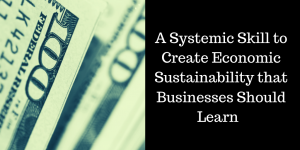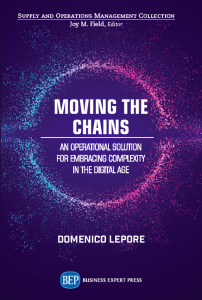
Every business today shares a legitimate desire: to achieve not just economic success but economic sustainability. But we are living with unprecedented uncertainty. The world is changing at such a pace that it seems almost impossible to stay abreast of the shifts. While there are young companies that seem to grow exponentially, we can wake up to discover that a household name we grew up with is under threat or about to disappear. Across the board, it has become harder to compete.
Dealing with multiple and shifting inputs every day can be a destabilizing experience. How can you consistently hit the mark if the target keeps on moving? Not only is it challenging, it feels unfair when we work so hard every day to do what we do better. But as Dr. W. Edwards Deming has pointed out, everybody doing their best is not the answer.
Underlying principles
So if everybody doing their best is not the answer, what is? Focusing on the very few elements that are at the root of sustainable success. This is what systems science teaches us, if we are willing to learn.
Never like today has it become necessary to be strengthened through the knowledge and understanding of certain underlying systemic principles that affect us all. There are several facets of understanding and operating a business systemically to gain a competitive edge and they are all interconnected. In over 20 years of transferring systemic knowledge to companies in many sectors, it became clear that at the deepest level, it has to do with how an organization is structured. Unless that structure is designed and operated to overcome artificial barriers and accelerate flow, it is actively undermining everyone’s efforts. But that subject is beyond the scope of one blog post.
A systemic skill that really matters
For today, let’s take a look at one systemic skill that can have a dramatic impact on our economic sustainability. In the Digital Age, to thrive we must always be adding value. It is no longer sufficient just to have a good product or service. We have to make sure that our product or service is directly solving a specific problem, or set of problems, that are keeping our customers stuck. If we are aware of these specific problems in the current reality of our customer and we are able to address them, we are no longer just a supplier, we are a partner.
In the Theory of Constraints, there is a systemic Thinking Process that allows us to systematically frame and address a situation of blockage. It’s called the Core Conflict Cloud. We can build it for ourselves as an organization to move us through from a situation of blockage to a breakthrough. This process in itself helps us gain the cognitive flexibility and ability to continuously innovate. But we can also build it for a customer or potential customer.
Listing the Undesirable Effects
We start by listing all the ‘Undesirable Effects’ (UDEs) of a given situation because these are like “symptoms” we can use to identify a deeper problem. We may already know our customer’s reality well enough to list them or we can ask them to share them with us. Once we have the list, we can look for commonalities and we will see that they fall into a much shorter list of categories, for example, poor communication, insufficient attention to quality. With this information, and some practice, we can verbalize an overarching statement that encompasses all of their UDEs. We will then have identified the undesirable current reality our customer is living with.
So the systemic question becomes, how can our product/service directly address this? How do we actively take some of their pain away? And, how are we in any way part of the problem? How do we affect the value chain?
These are just the first of a series of steps on the path to crafting and delivering what Dr. Eli Goldratt who developed the Theory of Constraints called “an unrefusable offer”. But even these first steps shift us from being people who “push” a product or service to people who care about and do something to make our customers’ lives better. Being able to make “unrefusable offers” is vital for economic sustainability.
Building our systemic intelligence
By learning to use systemic thinking processes on an ongoing basis, not only do we solve problems in a much deeper and more effective way, we also create new synapses and new cognitive abilities that give us an edge. As Dr. Deming pointed out, learning is not compulsory, but neither is survival. With a competitive edge based on systems science, we shift from being constantly baffled by changing scenarios to becoming active agents of innovative solutions. We evolve from being suppliers to co-creators of success. We become indispensable.
Download Chapter 10 of our book ‘Sechel’ to read more about building a Core conflict
Leaders and managers are facing unprecedented change in the Digital Age. To compete they must shift to a systemic mindset and way of conducting operations. We work alongside CEOs and Executive Teams to support the shift towards more effective, systemic strategy and operations. Our books include ‘Deming and Goldratt: The Decalogue‘, ‘Sechel: Logic, Language and Tools to Manage Any Organization as a Network’, ‘The Human Constraint‘, ‘Quality, Involvement and Flow: The Systemic Organization’ , and now ‘Moving the Chains: An Operational Solution to Embrace Complexity in the Digital Age‘ .We support our international clients through education, training and the Ess3ntial multi-project software using Critical Chain to schedule competencies and unlock the potential of human resources. Based on our proprietary Decalogue methodology.






Leave a Reply